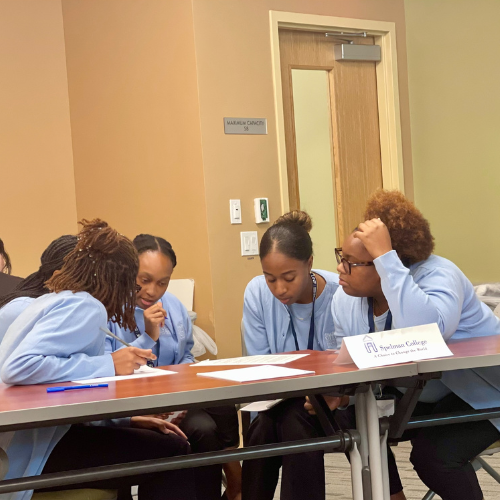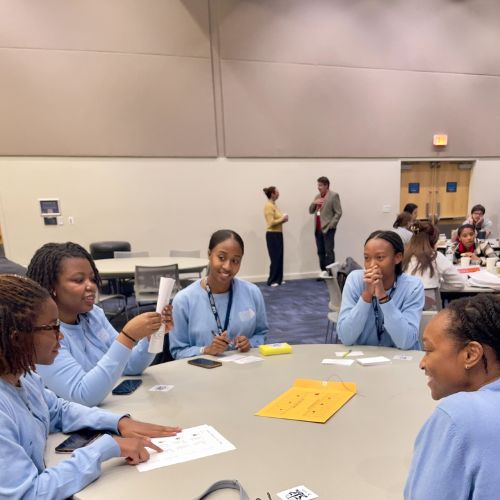Spelman College Launches First-Ever Deliberative Exchange Team, Advances to National Ethics Bowl
The Team’s Approach Emphasizing Dialogue Over Debate, Earns Recognition for Grace and Intellectual Depth
 For the first time in its 144-year history, Spelman College has formed a Deliberative Exchange Team — and the student-led group has already qualified for nationals.
For the first time in its 144-year history, Spelman College has formed a Deliberative Exchange Team — and the student-led group has already qualified for nationals.The team, made up of students from the Ethel Waddell Githii Honors Program -- seniors Mackenzie Hickson, Zoe Shepherd, Jayda Hendrickson and Gabrielle Harris, along with first-year student Gabrielle Hurd, is one of 36 teams nationwide that will compete in the Intercollegiate Ethics Bowl National Championship, March 7-8 in St. Louis, Missouri. More than 200 teams and 150 schools participated in 14 regional competitions across the U.S. this fall.
"What I appreciate most about the Ethics Bowl is its affirmation that disagreement can be a site of integrity — that principled, nuanced discussion deepens our capacity for understanding when ideas are in tension," said Michelle Hite, Ph.D., associate professor of literature, media and writing and director of the honors program.
It all started when Eric Smaw, Ph.D., reached out to Hite. Smaw, who chairs the philosophy department and directs forensics and debate at Rollins College in Winter Park, Florida, founded the Deliberative Exchange program. He's also an adjunct professor of clinical ethics at Florida State University's College of Medicine.
Smaw told Hite that her required honors program structure, built around the "Habits of Mind for Intellectual Sovereignty," was already preparing students perfectly for deliberative exchange — with its emphasis on independent thought, reflection and respectful communication.
But before Hite could even say yes to starting a team, Hickson, a health sciences major with a minor in women's studies and Rhodes Scholar finalist, had already reached out to Smaw herself.
"I hoped in collaborating with Dr. Smaw that I might be able to author a new language and offer a more humanist perspective for traditional ethics, reflective of my own lived experience and the rich archive of Black life," Hickson said.
"Early on, I'd established that on our team, we are interested, beyond what our peers at other institutions might be, in defining how we can consider these cases with an emphasis on preserving human dignity."
What is Deliberative Exchange?
Unlike debate, where opposing sides compete to win arguments, deliberative exchange is a structured method where participants work collaboratively toward common understanding. The goal is to listen to other perspectives, find meaning and reach agreement on complex issues.
In deliberative exchange, participants exchange arguments and consider different claims designed to secure the public good. Rather than proving each other wrong, they keep an open mind and may reevaluate or even change their own points of view based on what they learn.
Spelman's team prepared by analyzing 12 collaborative ethical case studies, focusing on thoughtful dialogue and finding common ground rather than winning debates.
"In our preparation at Spelman throughout matriculation and for this competition specifically with Dr. Smaw, Hite and Prof. Ariana Benson, we sought to make this exchange as collaborative as possible, leaning into each other's unique strengths and establishing a strong sense of synergy in our team's style and approach," Hickson said.
Their approach earned recognition for grace, teamwork and intellectual depth — the qualities that helped them qualify for nationals.
About the Ethics Bowl

The competition is hosted by the Association for Practical and Professional Ethics Intercollegiate Ethics Bowl, also known as the APPE IEB. According to its website, "APPE IEB is a unique, collaborative experience for undergraduate students that provides valuable educational experience in practical and professional ethics."
"Teams spend hours analyzing and preparing for regional and national competitions to see who has thought most deeply and presented their arguments most clearly on cases based on today's most pressing issues," according to the association's website.
"Students also develop ethical understanding of complex, ambiguous and difficult to resolve issues, as well as key virtues associated with democratic deliberation."
